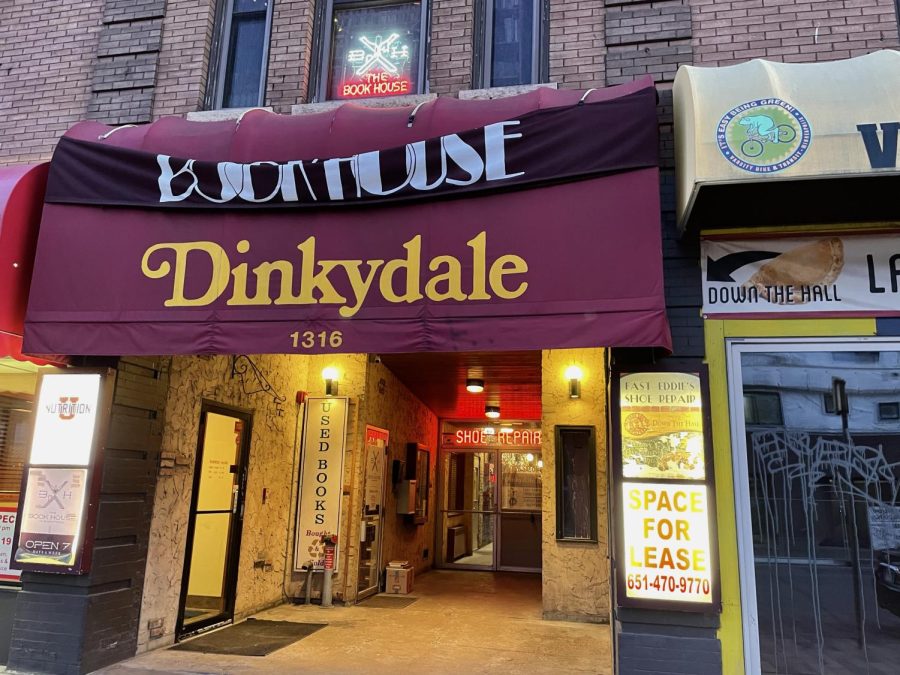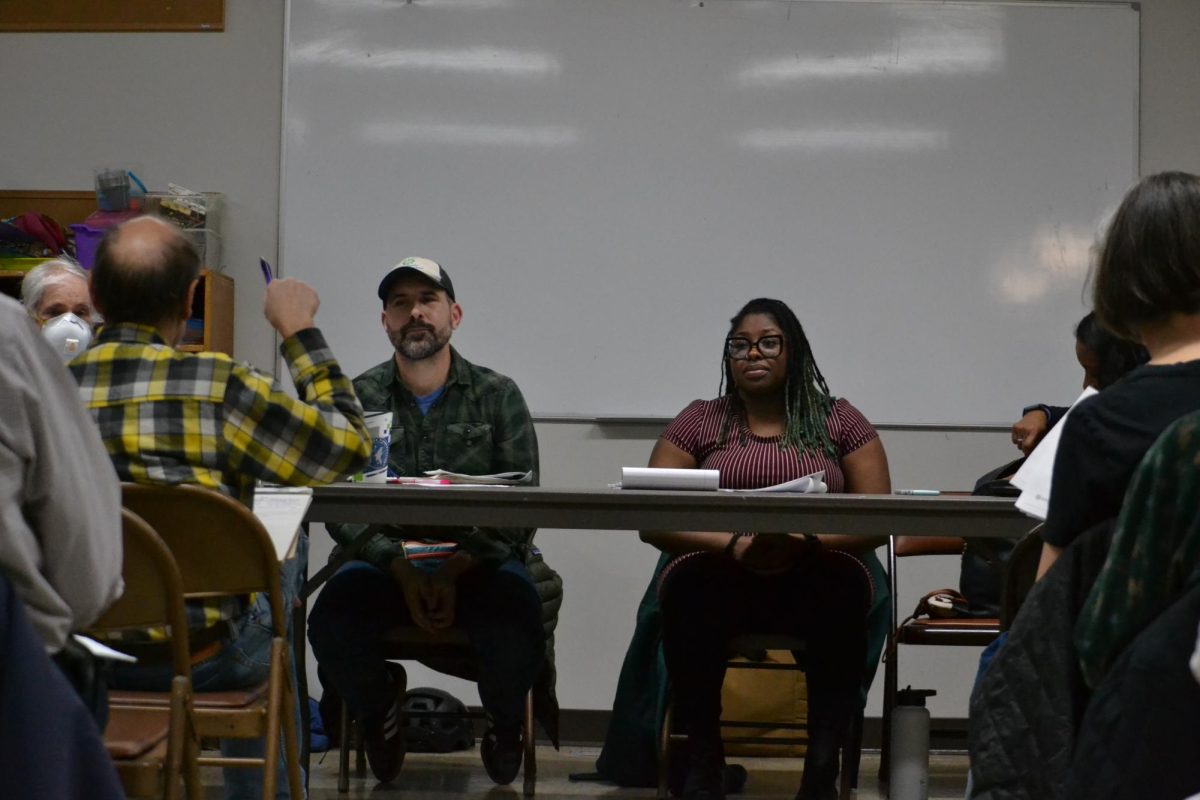With the recent closing of Land’s End Pasty Company and Fast Eddie’s Place, Dinkytown’s locally-owned businesses are fighting the neighborhood trend toward more chain stores and fewer locally-owned shops.
More than half of all restaurants, bars, shops and apartments in Dinkytown are either chain stores or owned by an out-of-state corporation.
Rising rent costs and the demolition of historic buildings in favor of new apartment buildings are major factors behind the shift toward less locally-owned non-chain stores, according to Kristen Eide-Tollefson, owner of The Book House and a founder of Preserving Historic Dinkytown.
Despite these struggles, many local business owners are staying in Dinkytown because of their passion for the area.
Eide-Tollefson said seeing the enthusiasm of the University of Minnesota community, past and present, is what motivates her to maintain the cultural identity of Dinkytown.
“My motive is I’ve been listening to students and alumni for 47 years tell me how much they love Dinkytown, how important it is to them and how much they love the small business district,” Eide-Tollefson said. “That’s really why I’m involved.”
The rise in Dinkytown chains
With the arrival of Dinkytown McDonalds and the upcoming openings of Subway and Five Guys, Dinkytown is seeing an influx of chain restaurants.
Owner of Tony’s Diner, Tony Nicklow, said a transition to a primarily chain-run neighborhood would be a worst-case scenario for everyone.
“We don’t want to turn into a completely chained-operated neighborhood,” Nicklow said. “That would be a nightmare.”
While chain restaurants are associated with corporate managers, many of these stores are run by local franchisees.
The franchisee for Dinkytown Raising Cane’s and Dinkytown Business Alliance President Kent Kramp said it is important to differentiate between corporate managers and local franchisees.
Unlike corporate managers, local franchisees have stronger ties to the community and are more committed to the local area, according to Kramp.
Eide-Tollefson said after owning a business for nearly 50 years, the differences between a corporate manager and a franchisee like Kramp are evident.
“One of the things we learned to do is to distinguish between corporate and franchisee,” Eide-Tollefson said. “The big difference there is that when you're trying to be a business district, it's pretty hard to do it with corporate managers because it's not their job.”
Kramp said owning a chain store gives you access to company knowledge whereas local store owners do not have that, giving chain stores an advantage.
“There’ll be questions that already have been answered and lessons have already been learned that just get passed on to you through the system,” Kramp said.
Alison Kirwin, owner of Al’s Breakfast, said while franchise stores may have local ownership, it is not the same as independently-run stores.
“Among other things, you get to know other independent business owners in a different way than you would have a franchisee,” Kirwin said. “It feels more like a peer group of people if you're talking to other independent business owners.”
Chain stores have national recognition and advertisements on TV and billboards, something mom-and-pop stores do not.
Nicklow said when opening a store, chain stores already have the name-brand recognition that locally-owned stores have to establish from the ground up.
“These chains have the resources and money to really brand themselves and get the advertising and marketing out that we don't have,” Nicklow said. “A lot of my marketing is just word of mouth.”
New apartments change the culture of Dinkytown
In her decades of owning The Book House, Eide-Tollefson said the destruction of historic Dinkytown buildings in favor of new multi-story apartment buildings has damaged the cultural identity of Dinkytown.
Visually distinct buildings, like the ones housing Al’s Breakfast and The Book House, give Dinkytown a unique feel when compared to the rest of Minneapolis, according to Eide-Tollefson. For her, new apartments should be built in the surrounding neighborhoods rather than Dinkytown in order to retain its cultural heritage.
“I see no reason to build more housing in the middle of the historic commercial district,” Eide-Tollefson said. “The old buildings hold memories for every, every generation of students and alumni.”
Not every business owner feels the same way about the new apartments.
Nicklow said the development of new apartments has revitalized Dinkytown in the wake of COVID-19 by bringing more University students to the area on a daily basis.
“It’s a lot busier now with all the kids and people living in the area. It’s going to bring a whole new energy which has been lacking especially during the pandemic. It’s going to have more of a community feel,” Nicklow said. “[Dinkytown] is always going to keep changing, but this is a good change.”
For decades, many locally-owned stores closed and those historic buildings were destroyed and rebuilt to make way for new apartments and chain restaurants, according to Eide-Tollefson.
Kirwin said, in her nearly 30 years working at Al’s, mom-and-pop shops have closed only to be replaced by chain restaurants.
“There was more than one bookstore. There was music and there was a music store and there was a musical instrument store and a record repair shop and a hardware store like things that you could actually use,” Kirwin said. “It went from being a place that was functional all by itself to a place that people only come to eat.”
For the locally-owned stores still left, rent increases are becoming a common theme.
Nicklow said landlords have responded to more people moving into Dinkytown by increasing rent on local business owners.
“A lot of landlords see all these people living in town and think they can raise the rent significantly,” Nicklow said. “Students still have budgets. They’re not eating fine dining or anything, so you try to keep your prices as low as you can for students, but at the same time, you gotta pay the bills too.”
Lee Sayt, former owner of The Cove, mirrored Nicklow’s sentiment on the rising rent costs. Sayt said he was forced to sell his business after his rent spiked when the new apartments were built.
“Rent is sky-high in Dinkytown, especially after all the new buildings popped up. They doubled my rent,” Sayt said. “In the near future, I don’t see any mom-and-pop shops left in Dinkytown as they will be priced out.”
Local business owners find a way
From economics to customer service, owners have found ways to survive in Dinkytown despite the problems they face.
Nicklow said since he first opened his diner, he has learned to take advantage of the summer months when business is slower by doing repairs and taking time off.
“You take a step back and do the little things. Make sure everything’s working, make the repairs you have to make and go take a little time off,” Nicklow said. “The first few years we were just struggling in the summer.”
Eide-Tollefson said The Book House has found a stable source of income by selling books both in-store and online.
“We do have an online and we do have a retail,” Eide-Tollefson said. “When the retail is low, online is supporting us and when the online drifts into an Amazon crisis or something else, then the retail supports us.”
To separate themselves from chain stores, local businesses try to emphasize what makes their store special. Nicklow said reasonable prices, quality food, good customer service and the care they put into their work are why the University community continues to support them.
“Hopefully, they’ll realize our quality and our pricing and our customer service is better than a chain restaurant,” Nicklow said. “We put a lot more love into what we do every day.”
Why they do it
While running a business in Dinkytown is becoming more difficult than ever, for local owners, it’s about the community and the passion they have for their work.
Eide-Tollefson said her decades running The Book House have been difficult but the students and alumni have made it worthwhile.
“It's not easy to be a small business in over 47 years. Lots of sacrifices and lots of stubborn determination,” Eide-Tollefson said. “What has kept me at this is the compassion that students have for Dinkytown and alumni have for Dinkytown.”
For others, owning a local business is about the connection between a shop and the community that keeps it going.
Kirwin said the narrow store dimensions of Al’s forces everyone to pack together, almost like a family.
“It’s a really unique place where you really get to know your coworkers and the people in front of you at the counter,” Kirwin said. “It becomes family in a lot of ways just because of our tiny, small space.”
Eide-Tollefson said being integral to not only the culture of Dinkytown but also to University students and alumni has been an integral part of why she has stuck around.
“We’re really lucky to be in the University area and have such interesting customers and customers who are passionate about such a wide range of things,” Eide-Tollefson said. “It feels like we're feeding the culture. We’re performing a cultural service.”






















